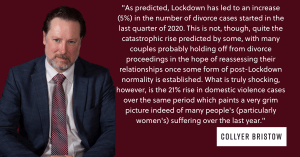- Family and divorce

Shorter Reads
Cohabitee crisis – a long and winding road
Christina Pippas responds to the UK Parliamentary Committee on Women and Equalities’ enquiry into Cohabitee’s rights.
2 minute read
Published 24 November 2021
Key information
- Services
- Family and divorce
Earlier this month the UK Parliamentary Committee on Women and Equalities took evidence on the seemingly intractable and perennial problem of cohabitees’ rights. Or, rather, the distinct lack of them.
One in four families now consists of cohabiting couples. Shockingly, though, as was forcefully pointed out to the Committee, this area of law is still “not fit for purpose” and “fundamentally needs to be changed because it is out of kilter with modern-day society.”
In its attempt to try to ensure better and more wide-ranging rights for cohabitees on relationship breakdown, the Committee was interested in how such couples experience the legal system after separation.
Many cohabiting couples looking for legal advice have fallen into the trap of thinking that they have acquired rights simply by virtue of living together for a period of time. Often, it is not until their relationship breaks down that unmarried couples realise that the concept of a common law marriage is a myth and, in fact, the legal system does not provide them with any financial security or road map for dividing income and assets post-separation.
For example, in the absence of a cohabitation agreement, cohabitees have no automatic claim on each other’s assets, or rights to maintenance for themselves. This is the case however long they have been cohabiting and however many children they have together. This can have devastating consequences for the financially weaker party when such relationships break down, particularly when there are young children.
There are some options available for these families. For example, unmarried couples may have a claim under TOLATA (Trusts of Land and Appointment of Trustees Act 1996) that allows them to establish an interest in the family home.
While courts are sympathetic to people in this position, it is a very technical area and, in the absence of legal advice and representation (unaffordable for most, with the almost complete withdrawal of legal aid) it is virtually impossible for those caught up in this archaic legal labyrinth to represent themselves satisfactorily.
Ironically, if a cohabitee dies, their partner is often in a safer position than if the relationship had simply ended because, after two years of cohabitation, the surviving partner can make a claim under the Inheritance (Provision for Family and Dependence) Act 1975. And, of course, there is a possibility that the couple will have made Wills in each other’s favour.
However, there is no automatic right for a cohabitee to inherit in such circumstances and, aside from the heartbreak, pursuing such a claim is a costly and lengthy process.
Predictably, it is women who are most likely to suffer financial hardship in such cases, and recent surveys show that two-thirds of cohabitee clients seeking legal advice are indeed female. This stems from the continuing tendency for it to be mothers rather than fathers who make career sacrifices to assume caregiving and home-making roles.
Whilst such contributions are considered equal to that of the breadwinner within a marriage, no such attempt to avoid blatant sexual discrimination exists in the law as it applies to cohabiting couples.
The main legal recourse available to a mother in such situations is to bring a claim on behalf of the children under Schedule 1 of the Children Act but, while the courts are ready to use this legislation to protect vulnerable mothers, there are considerable limitations due to the fact that any financial support so obtained has to be directed to the children and not the parent. Also, of course, this route is only available to those who are caring for minor children.
There is clearly wholesale injustice in this area generally. In addition, there are specific problems such as religious marriages that are not recognised as legal marriages. Upon breakdown, these can also leave women (invariably), who may be ignorant of their status in law, in financially dire straits.
Pension rights for cohabitees (i.e. the ability to claim against one’s ex-cohabitant’s pension) is another area that is completely neglected by the law as it stands, with the inevitable result that the state often has to pick up the burden of support in old age, in circumstances where this should not have been necessary. This alone should be enough to encourage legislative action in this area.
The most obvious solution, as proposed by the Committee, is for there to be automatic acquisition of defined rights (not dissimilar to those enjoyed by married couples) after a defined period of cohabitation. Periods of between two and five years are thought by most to be fair.
Dispiritingly, however, while this debate has been rumbling on for decades, positive change in this area continues to face considerable obstruction from those who feel that increasing cohabitants’ protection is likely to undermine traditional (i.e. married) family structures.
It will, therefore, not be an easy task to persuade parliament to bring about the necessary legislative changes. If large scale injustice is to be avoided in future (at huge cost to the taxpayer) it is, however, vital that such changes are made sooner rather than later.
First published in EPrivateClient in November 2021 (subscription required) Access the original article here.
Shorter Reads
Cohabitee crisis – a long and winding road
Christina Pippas responds to the UK Parliamentary Committee on Women and Equalities’ enquiry into Cohabitee’s rights.
Published 24 November 2021
Associated sectors / services
Authors
Earlier this month the UK Parliamentary Committee on Women and Equalities took evidence on the seemingly intractable and perennial problem of cohabitees’ rights. Or, rather, the distinct lack of them.
One in four families now consists of cohabiting couples. Shockingly, though, as was forcefully pointed out to the Committee, this area of law is still “not fit for purpose” and “fundamentally needs to be changed because it is out of kilter with modern-day society.”
In its attempt to try to ensure better and more wide-ranging rights for cohabitees on relationship breakdown, the Committee was interested in how such couples experience the legal system after separation.
Many cohabiting couples looking for legal advice have fallen into the trap of thinking that they have acquired rights simply by virtue of living together for a period of time. Often, it is not until their relationship breaks down that unmarried couples realise that the concept of a common law marriage is a myth and, in fact, the legal system does not provide them with any financial security or road map for dividing income and assets post-separation.
For example, in the absence of a cohabitation agreement, cohabitees have no automatic claim on each other’s assets, or rights to maintenance for themselves. This is the case however long they have been cohabiting and however many children they have together. This can have devastating consequences for the financially weaker party when such relationships break down, particularly when there are young children.
There are some options available for these families. For example, unmarried couples may have a claim under TOLATA (Trusts of Land and Appointment of Trustees Act 1996) that allows them to establish an interest in the family home.
While courts are sympathetic to people in this position, it is a very technical area and, in the absence of legal advice and representation (unaffordable for most, with the almost complete withdrawal of legal aid) it is virtually impossible for those caught up in this archaic legal labyrinth to represent themselves satisfactorily.
Ironically, if a cohabitee dies, their partner is often in a safer position than if the relationship had simply ended because, after two years of cohabitation, the surviving partner can make a claim under the Inheritance (Provision for Family and Dependence) Act 1975. And, of course, there is a possibility that the couple will have made Wills in each other’s favour.
However, there is no automatic right for a cohabitee to inherit in such circumstances and, aside from the heartbreak, pursuing such a claim is a costly and lengthy process.
Predictably, it is women who are most likely to suffer financial hardship in such cases, and recent surveys show that two-thirds of cohabitee clients seeking legal advice are indeed female. This stems from the continuing tendency for it to be mothers rather than fathers who make career sacrifices to assume caregiving and home-making roles.
Whilst such contributions are considered equal to that of the breadwinner within a marriage, no such attempt to avoid blatant sexual discrimination exists in the law as it applies to cohabiting couples.
The main legal recourse available to a mother in such situations is to bring a claim on behalf of the children under Schedule 1 of the Children Act but, while the courts are ready to use this legislation to protect vulnerable mothers, there are considerable limitations due to the fact that any financial support so obtained has to be directed to the children and not the parent. Also, of course, this route is only available to those who are caring for minor children.
There is clearly wholesale injustice in this area generally. In addition, there are specific problems such as religious marriages that are not recognised as legal marriages. Upon breakdown, these can also leave women (invariably), who may be ignorant of their status in law, in financially dire straits.
Pension rights for cohabitees (i.e. the ability to claim against one’s ex-cohabitant’s pension) is another area that is completely neglected by the law as it stands, with the inevitable result that the state often has to pick up the burden of support in old age, in circumstances where this should not have been necessary. This alone should be enough to encourage legislative action in this area.
The most obvious solution, as proposed by the Committee, is for there to be automatic acquisition of defined rights (not dissimilar to those enjoyed by married couples) after a defined period of cohabitation. Periods of between two and five years are thought by most to be fair.
Dispiritingly, however, while this debate has been rumbling on for decades, positive change in this area continues to face considerable obstruction from those who feel that increasing cohabitants’ protection is likely to undermine traditional (i.e. married) family structures.
It will, therefore, not be an easy task to persuade parliament to bring about the necessary legislative changes. If large scale injustice is to be avoided in future (at huge cost to the taxpayer) it is, however, vital that such changes are made sooner rather than later.
First published in EPrivateClient in November 2021 (subscription required) Access the original article here.
Associated sectors / services
- Family and divorce
Authors
Need some more information? Make an enquiry below.
Subscribe
Please add your details and your areas of interest below
Article contributor
Christina
PippasAssociate
Specialising in Family & divorce
Enjoy reading our articles? why not subscribe to notifications so you’ll never miss one?
Subscribe to our articlesMessage us on WhatsApp (calling not available)
Please note that Collyer Bristow provides this service during office hours for general information and enquiries only and that no legal or other professional advice will be provided over the WhatsApp platform. Please also note that if you choose to use this platform your personal data is likely to be processed outside the UK and EEA, including in the US. Appropriate legal or other professional opinion should be taken before taking or omitting to take any action in respect of any specific problem. Collyer Bristow LLP accepts no liability for any loss or damage which may arise from reliance on information provided. All information will be deleted immediately upon completion of a conversation.
Close









































